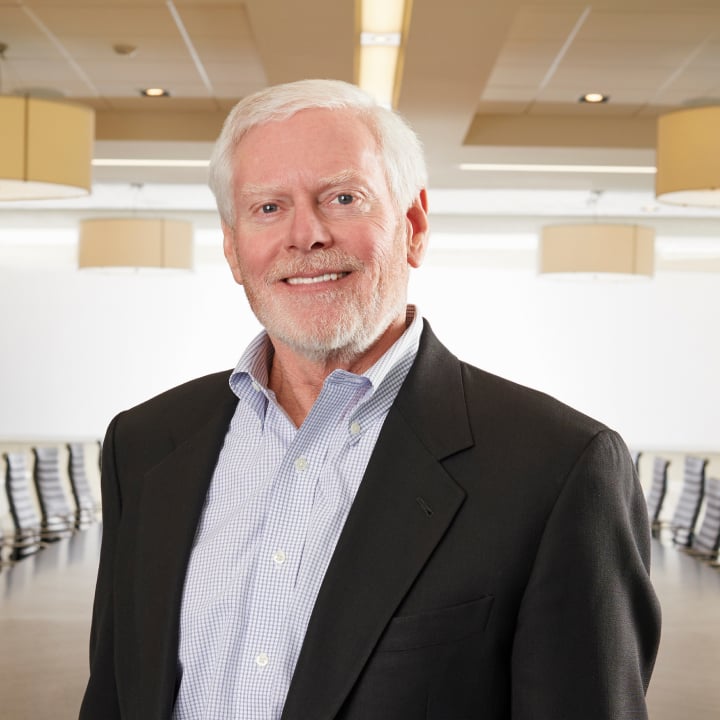As it searches for a new CEO, Illumina faces a high-stakes year of challenges
Just two and a half weeks after the abrupt exit of Illumina’s CEO Francis deSouza, the DNA sequencing giant is facing one of the most pivotal periods in its history.
It has promised investors $100 million in cost cuts, is awaiting the final outcome in an antitrust saga stemming from its $7.1 billion acquisition of cancer test developer Grail, and faces competition that wasn’t there a few years ago. This all comes amid its search for a new CEO, who will have to lead the San Diego-based company through those difficulties.
The hope is that the company, whose machines are ubiquitous in drug and medical labs across the world, can restore some of the shine that once made it the darling of researchers and investors alike. But the challenges have changed from the last decade, during the company’s phase of rapid growth.
“The playbook will have to be a bit different than in the past,” said Dan Brennan, an analyst at the investment bank TD Cowen.
Endpoints News reached out to Illumina with questions about its succession plans and other matters, and the company declined to comment.
While none of those problems are small ones, the CEO search is perhaps the most pressing. Illumina has hired Bench International, a firm specializing in life sciences recruitment.
 Francis deSouza
Francis deSouzaIt has been less than three weeks since deSouza’s exit, and Illumina has said it’s looking for internal and external candidates after naming general counsel Charles Dadswell as interim chief. Illumina, which declined to comment, as did Bench, has said little else about what type of candidate it is seeking.
Carl Icahn, the activist who launched a proxy fight and pushed for deSouza’s ouster, had months ago floated the return of the company’s ex-CEO, Jay Flatley. Flatley led the company from 1999 to 2016 and was popular among employees for fighting off a hostile takeover bid by Roche and turning Illumina into the largest DNA sequencing company in the world.
Flatley, who handpicked deSouza for the CEO role and stepped down as chairman in 2021, has largely kept quiet in public about the company.
But not entirely quiet.
He told the Financial Times in January that in hindsight Illumina should have held off on the $7.1 billion Grail deal while the market was overheated.
 Jay Flatley
Jay FlatleyAnd more recently, Flatley told several people close to him that he is open to coming back as CEO or in another capacity if the board asks, according to two people familiar with his thinking.
It’s not clear if the board would welcome him. One person familiar with the process said Flatley lacked support on the board for any CEO bid, in part because of the perception by some there that he misled people at the company about his involvement in the activist process.
Flatley vigorously denied that characterization. “I can tell you that is blatantly untrue,” he said in a text message to Endpoints, and declined an interview request.
Talent exodus
No matter who takes over, they’ll have to figure out how to stem an exodus of talent that has created new competition for the company.
Under deSouza, Illumina made progress reaching beyond research labs and into hospitals and clinics. But the company in recent years has struggled at times with where precisely to focus and it sometimes stumbled in executing its vision, according to current and former employees.
DeSouza did not respond to a request for comment.
The company’s voluntary turnover among directors and above stood at 5% in 2018 and ticked up a percentage point the next year. But the figure jumped to 13% in 2020 and climbed to 17% the following year. The rate dropped to 7% in 2022, according to Illumina’s 2022 and 2021 corporate social responsibility reports.
Competitors like Roche have poached Illumina talent, and the departures have led to a rise in startup competitors like Element Biosciences. Molly He – Element’s CEO and a former senior director at Illumina – said that when customers have considered one of Element’s machines, Illumina has responded by discounting its prices.
“It’s a common theme,” said He. As of last month, Element had sold about 50 of its desktop sequencers, and the company has about 300 employees.
Shawn Baker, a genomics consultant and former Illumina employee, said companies commonly discount products for key opinion leaders in the space.
“Illumina having to offer discounts in the face of new competition is exactly what I would expect,” Baker said.
Illumina is profitable, but financial pressure is evident. In its latest quarterly results, Illumina reported revenue of $1.1 billion during the first quarter, down 11% from the same period in 2022.
While Illumina’s fledgling competition is grabbing headlines, the company still commands some 80% of the market, according to a recent analysis from Baker.
“It’s pretty easy to get excited about all the new competition — and there is new competition,” Baker said. “It doesn’t just change instantly. It’s not like flipping a switch.”
And some of the startups helmed by ex-Illumina talent may actually aid the company by pushing into the frontiers of genomics in areas that Illumina hasn’t touched — while also being reliable customers for Illumina.
The future of Grail
Grail became a political football during the proxy fight with Icahn, who argued the deal was a costly mistake that should be reversed.
But former Grail CEO Jeff Huber, who ran the company from 2016 to 2017, said there’s a reason Illumina bought the company: The deal created the potential to accelerate the deployment of tests and drive down their prices, just as Illumina has done with DNA sequencing.
Huber fears Illumina will quickly divest Grail and follow through with Icahn’s suggestion for a “rights offering.” Icahn didn’t spell out how exactly this could work, but generally, rights offerings give existing shareholders rights to buy a number of shares of the company at a discount.
“The rights offering approach as proposed by Icahn has never been used for a company spinout, and there is no credible plan for addressing many critical issues that must be addressed to align investor interests and ensure the resulting company has appropriate capital and runway to succeed,” Huber said in an email. “If Grail were to be divested, the best approach is to secure patient permanent-capital investors that have a long view.”
Andrew Teno, who won a board seat with support from Icahn, declined to comment.
No matter what path Illumina takes with Grail, it appears it will see through its court fights with the Federal Trade Commission and the European Union, which blocked the takeover on antitrust concerns. If it can win, Illumina would be able to divest Grail on its own terms and preserve the company’s ability to grow through future acquisition.
After decades of waving through deals, the FTC used the Grail-Illumina deal as an opportunity to showcase the agency’s tougher stance. The two companies don’t compete – the old standard for scrutinizing transactions. Rather, Illumina makes sequencers while Grail sells blood tests to detect cancer.
The agency argued Illumina could use its size to throttle potential competition, a novel argument for life-sciences dealmaking. Amid the FTC’s clampdown, Illumina is limited in what companies it can buy, which could hurt its quest to push further into hospitals.
“It seems to hinder Illumina’s plan to enter the clinical space in a big way,” said Baker, the genomics consultant.